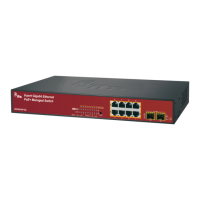7. SWITCH OPERATION
7.1 Address Table
The Switch is implemented with an address table. This address table composed of many entries. Each
entry is used to store the address information of some node in network, including MAC address, port
no, etc. This in-formation comes from the learning process of Ethernet Switch.
7.2 Learning
When one packet comes in from any port, the Switch will record the source address, port no. And the
other related information in address table. This information will be used to decide either forwarding or
filtering for future packets.
7.3 Forwarding & Filtering
When one packet comes from some port of the Ethernet Switching, it will also check the destination
address besides the source address learning. The Ethernet Switching will look up the address-table for
the destination address. If not found, this packet will be forwarded to all the other ports except the
port, which this packet comes in. And these ports will transmit this packet to the network it connected.
If found, and the destination address is located at different port from this packet comes in, the
Ethernet Switching will forward this packet to the port where this destination address is located
according to the information from address table. But, if the destination address is located at the same
port with this packet comes in, then this packet will be filtered. Thereby increasing the network
throughput and availability
7.4 Store-and-Forward
Store-and-Forward is one type of packet-forwarding techniques. A Store-and-Forward Ethernet
Switching stores the incoming frame in an internal buffer, do the complete error checking before
transmission. Therefore, no error packets occurrence, it is the best choice when a network needs
efficiency and stability.
The Ethernet Switch scans the destination address from the packet-header, searches the routing table
pro-vided for the incoming port and forwards the packet, only if required. The fast forwarding makes
the switch attractive for connecting servers directly to the network, thereby increasing throughput and
availability. How-ever, the switch is most commonly used to segment existence hubs, which nearly
always improves overall performance. An Ethernet Switching can be easily configured in any Ethernet
network environment to significantly boost bandwidth using conventional cabling and adapters.
Due to the learning function of the Ethernet switching, the source address and corresponding port
number of each incoming and outgoing packet are stored in a routing table. This information is
subsequently used to filter packets whose destination address is on the same segment as the source
address. This confines network traffic to its respective domain and reduce the overall load on the
network.
The Switch performs "Store and forward" therefore, no error packets occur. More reliably, it reduces
the re-transmission rate. No packet loss will occur.

